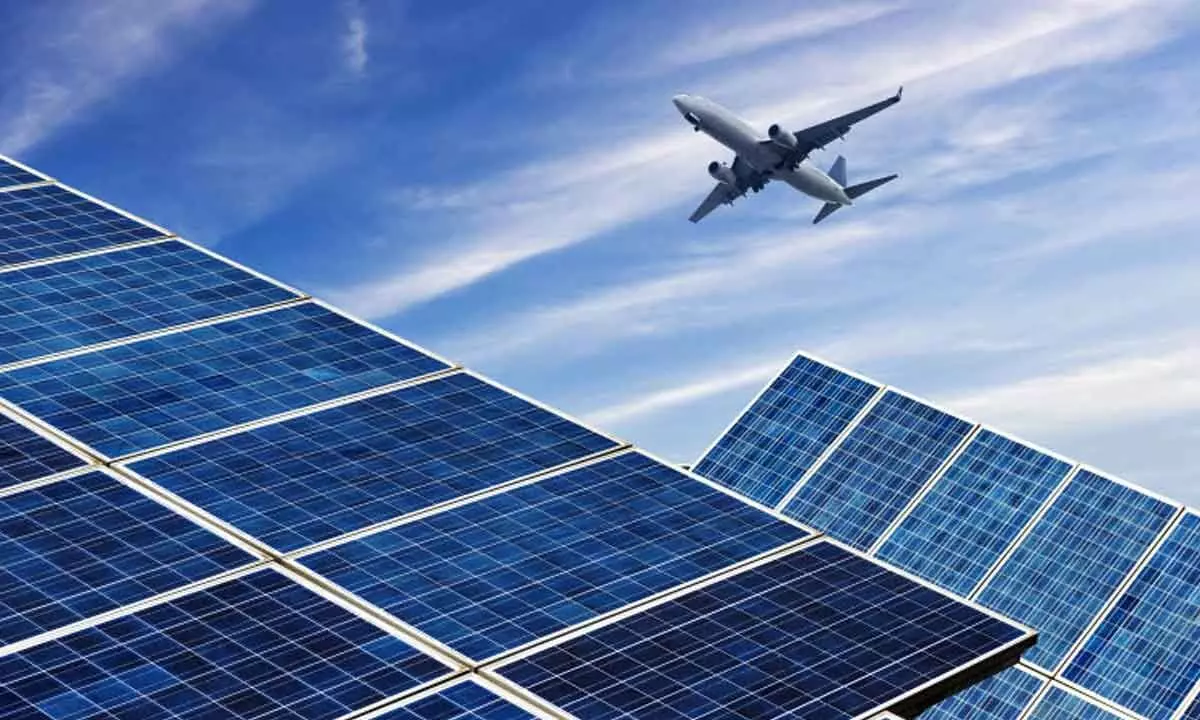Airports need to go Green
Worldwide international aviation is considered one of the most growing sources of greenhouse gas emissions
image for illustrative purpose

Airports of all sizes have an impact of some kind on the environment, both locally and potentially globally. This can include: Emissions from aircraft and ground vehicles, as well as from power use in buildings, all contributing to climate change and local air quality issues; Noise from aircraft for local residents; Potential to damage local wildlife and habitats and water courses and waste generation. Within the global context, airports have significant impact on the global environment in terms of climate change. At a local level, even though noise seems to be the main concern over the last 20 years, air emissions, resources (energy and water) availability, waste and waste water management, ecosystems and land use planning constitute issues that are directly linked to local communities' tolerance.
Worldwide international aviation is considered one of the most growing sources of greenhouse gas emissions. Even though aircraft emissions are not included in Kyoto protocol, emissions that are directly controlled by airport operators are ground-based and therefore are subject to national inventories and targets.
The most important measures that airports apply in order to reduce their carbon footprint or to manage emissions that are under their direct control include improvements in energy efficiency and conservation, ground fleet conversions, low emission power generation plants on site or renewable energy supplies. In some cases geothermal, hydropower, solar or wind power is used to cover a significant proportion of energy needs. In other cases many airports focus their efforts on achieving carbon neutral operations by offsetting carbon emissions that cannot be eliminated. It is worth mentioning that there are examples of airports that become carbon accredited to ensure efficient operations, to reduce costs, to raise airport's profile and credibility and to secure a license to grow.
Despite Covid-19 presenting unprecedented challenges to the implementation of the Strategic Objectives of the International Civil Aviation Organization (ICAO), the Organization has remained steadfast to its remit of environmental protection. It continues to lead the international aviation sector towards recovery, resilience, and sustainable growth. This 2022 Environmental Report is testament to ICAO's ongoing and thriving efforts in environmental protection to face the current challenges of our times. It would not have been made possible without the dedicated work of the ICAO Committee on Aviation Environmental Protection (CAEP) and its working groups, the active engagement of ICAO Council, from ICAO's 193 ICAO Member States, continuous support from the ICAO Secretariat, as well as ICAO's strong partnership with various industry stakeholders, many of which have deployed breakthrough innovations towards mitigating aviation CO2 emissions, in noise as well as in local air quality. Much progress has been made in the 2019-2022 Triennium, with ICAO continuing to develop recommendations, guidance, policies and Standards in relation to environmental protection. Highlights would include the ICAO Carbon Offsetting and Reduction Scheme for International Aviation (CORSIA) sustainability criteria for sustainable aviation fuels (SAF).
The annual ICAO stocktaking events have also become mainstays in the aviation sector calendar, and the ICAO Global Coalition for Sustainable Aviation comprising various stakeholders, provides a valuable network accelerating innovative aviation solutions. 2022 is a crucial year for ICAO. As preparations for the 41st Session of the ICAO Assembly intensify, the international aviation sector is on the cusp of delivering yet another milestone an ambitious long-term aspirational goal for international aviation (LTAG). There are high expectations for consensus amongst ICAO Member States on LTAG, and to facilitate implementation of the various innovations available - aircraft technologies, operations, and fuels, and means of monitoring the sector's progress.
A key step taken to facilitate sustainable aviation transition is the new ICAO Assistance, Capacity Building and Training for Sustainable Aviation Fuels (ACT-SAF) launched in June 2022. It will provide opportunities for all ICAO Member States to develop their full potential in SAF development and deployment, in line with ICAO's No Country Left Behind initiative. A decision on an ambitious LTAG will trigger further opportunities for similar programmes for additional aspects, (aircraft technologies and operations), contributing to aviation emissions to be established. In addition, the upcoming periodic review on the ICAO CORSIA will also ensure that its robust implementation continues to support the sector's sustainability, further cementing its role as a global market-based measure in mitigating international aviation emissions. ICAO's efforts and progress in the area of environmental protection, in collaboration with ICAO Member States and industry stakeholders, is crucial in ensuring the organization's continued relevance and impact in addressing global climate change issues through international aviation.

